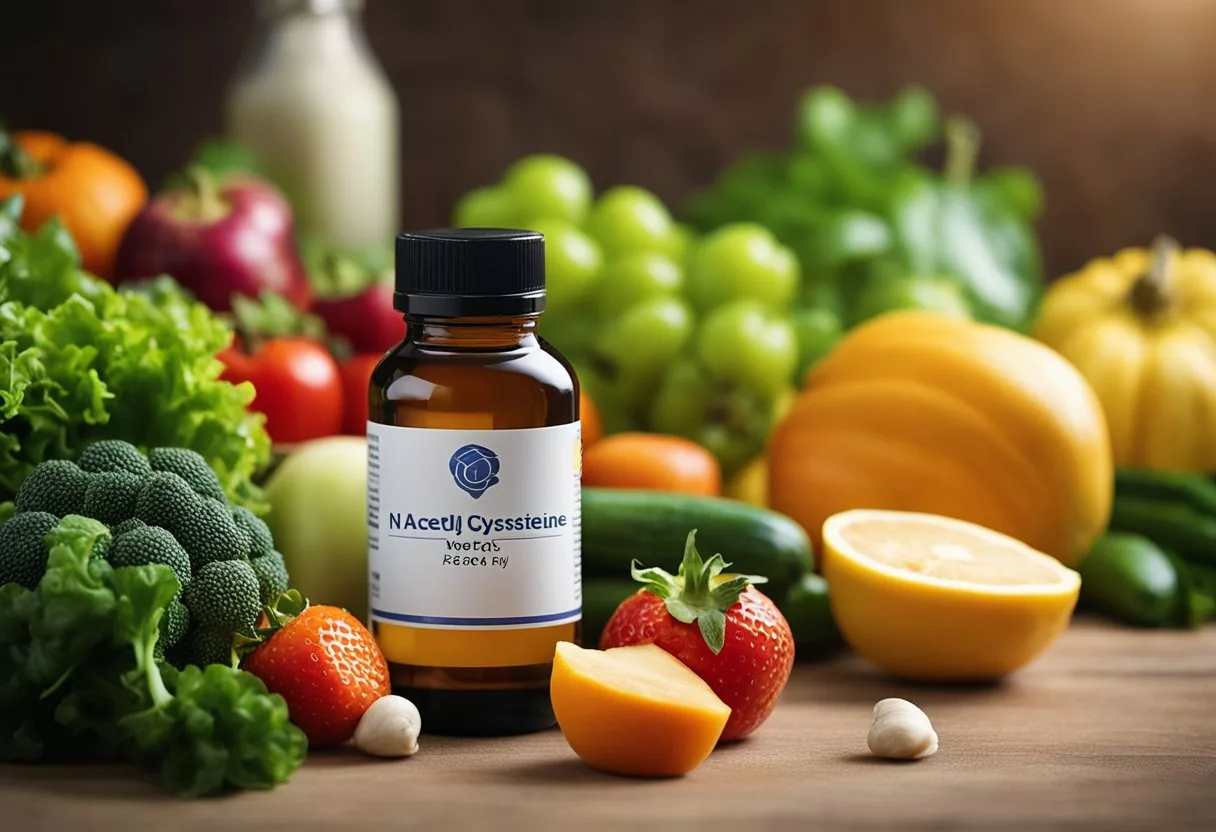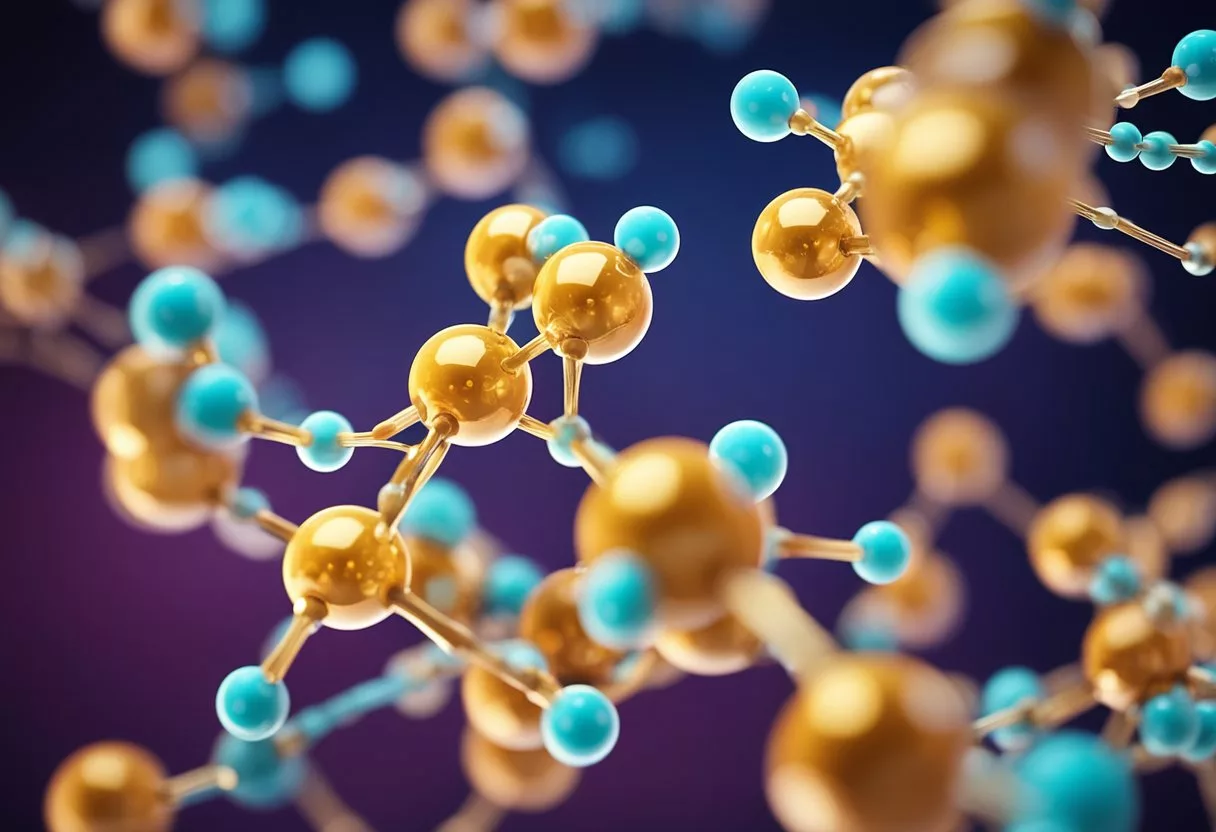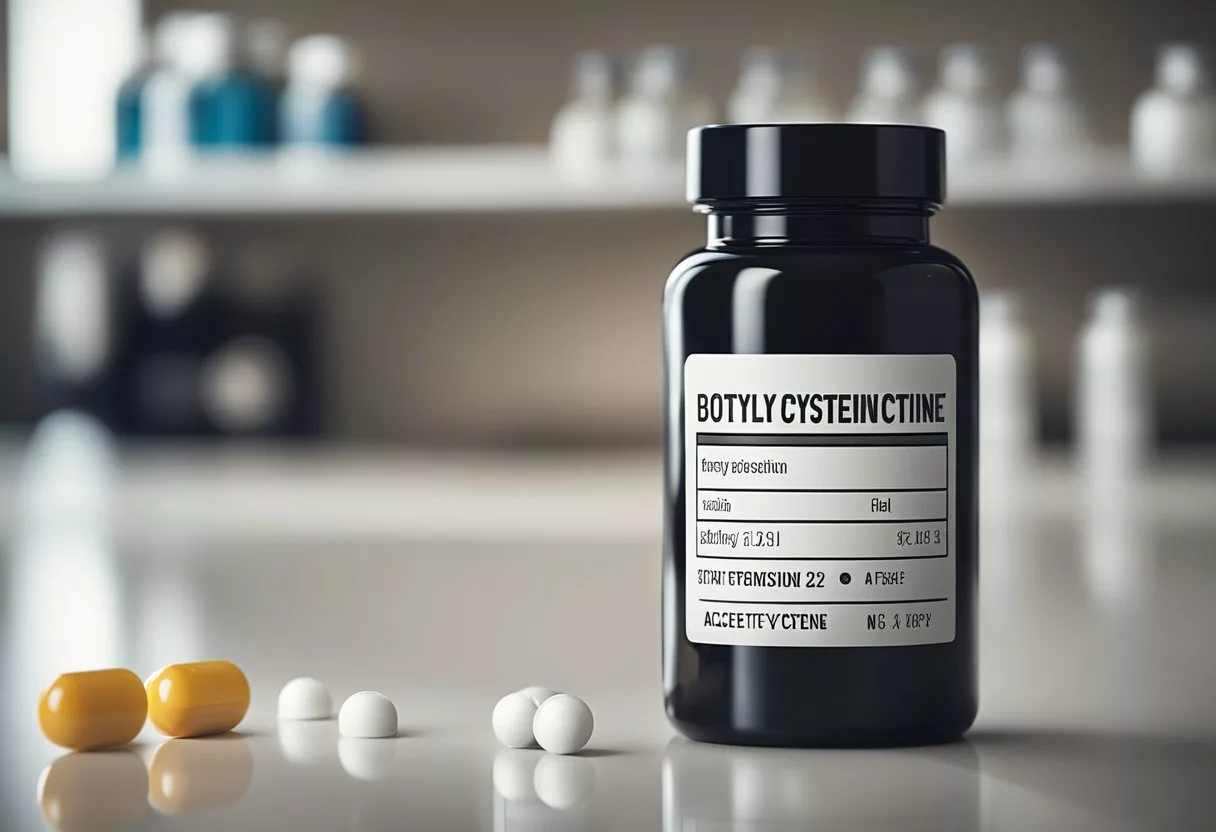N-Acetyl cysteine, commonly known as NAC, is a supplemental form of the amino acid cysteine. It has gained attention for its role in antioxidant protection and potential health benefits.
The body utilizes NAC in the production of glutathione, one of the most powerful antioxidants. Glutathione plays a crucial part in protecting against cellular damage and oxidative stress.
Recognized for its versatility, NAC can potentially offer a range of health benefits, from enhancing liver function and detoxification processes to supporting respiratory health.

While its uses in clinical settings are established, particularly for acetaminophen overdose, the interest in NAC’s wider health applications is increasing. Research suggests that it may support the immune system, contribute positively to mental health, and even influence chronic diseases.
Yet, as with any supplement, it is vital to understand the appropriate usage and any possible safety concerns, including drug interactions and contraindications.
Key Takeaways
- NAC supports the production of glutathione, an essential antioxidant for cellular health.
- Its benefits extend to liver detoxification, respiratory function, and immune response enhancement.
- Safe use of NAC involves awareness of proper dosages and potential interactions with medications.
Overview of N-Acetyl Cysteine

N-Acetyl Cysteine (NAC) is a supplement that has garnered attention for its role in human health. It stems from the amino acid cysteine, acting as its acetylated form.
- Role as a Precursor: Cysteine is a precursor to glutathione, a potent antioxidant in the body. NAC, thus, contributes to the synthesis of glutathione and bolsters the body’s defense against oxidative stress.
- Mucolytic Properties: With an ability to break down mucus, NAC is applied in medical treatments for conditions like cystic fibrosis and chronic obstructive pulmonary disease.
NAC’s mechanism extends beyond its antioxidant capabilities, influencing various bodily processes and showing potential in the treatment or management of certain diseases. Its properties can be particularly beneficial in safeguarding cells and tissues from damage caused by free radicals.
- Antioxidant Support: As an antioxidant, NAC helps protect cells from damage that can lead to chronic illness.
- Support for Detoxification: NAC plays a role in detoxifying harmful substances, notably in cases of acetaminophen overdose.
Clinical studies support its use for specific health conditions, while ongoing research continues to elucidate its broader applications. Through its various mechanisms, NAC can be a critical component in managing conditions characterized by excessive oxidative stress or mucus production.
Role in Antioxidant Production

N-acetyl cysteine (NAC), a precursor to the amino acid cysteine, plays a crucial role in the synthesis of glutathione, one of the body’s most powerful antioxidants.
Glutathione helps protect cells against oxidative stress, which can cause cellular damage and has been linked to various diseases.
The unique role of NAC lies in its ability to boost intracellular levels of glutathione. This elevation in glutathione is significant because it helps to maintain the antioxidant defense system of the human body.
NAC’s effectiveness in increasing glutathione levels has been supported by research. In studies, it has shown promise in mitigating the harmful effects of reactive oxygen species (ROS).
| Antioxidant | Role | Benefit |
|---|---|---|
| Glutathione | Neutralizes free radicals and detoxifies harmful substances | Protects cells from oxidative damage |
| NAC | Provides cysteine required for glutathione synthesis | Enhances the body’s overall antioxidant capacity |
Through its support of glutathione synthesis, NAC indirectly contributes to neutralizing harmful free radicals and supporting the body’s defense mechanisms. Additionally, evidence points towards NAC’s ability to act as an antioxidant itself, which may further reduce cellular vulnerability to oxidative stress.
Studies such as those documented by NCBI suggest that NAC can trigger the production of sulfane sulfur and hydrogen sulfide within the cells, contributing to its antioxidant properties. This multifaceted approach positions NAC as a key component in the body’s efforts to combat oxidative stress and maintain cellular health.
Liver Health and Detoxification

N-acetyl cysteine (NAC) plays a crucial role in supporting the liver, primarily by enhancing glutathione synthesis and assisting in the body’s detoxification processes. These mechanisms are particularly important in the context of mitigating liver damage and bolstering liver function.
Support in Detoxifying Processes
NAC is recognized for its key role in the synthesis of glutathione, a major antioxidant that is essential for liver detoxification. Glutathione binds to toxins, which can then be excreted from the body.
This process is vital for reducing the toxic load on the liver, especially following the ingestion of medication or alcohol, which are known to be metabolized by the liver.
Protection Against Liver Damage
Studies have shown that NAC can offer protection against liver damage, particularly damage caused by acetaminophen poisoning.
In cases of overdose, NAC serves as a precursor to glutathione, replenishing its levels to combat the harmful effects of the drug’s metabolites.
The protective role of NAC also extends to other forms of liver damage, potentially reducing the harmful impact of oxidative stress and inflammation on the liver.
Respiratory Health Benefits

N-Acetyl cysteine (NAC) serves as an important supplement with beneficial effects on respiratory health, specifically for its capability to thin mucus and support the management of various chronic pulmonary conditions.
Mucolytic Properties
NAC exhibits mucolytic properties, which means it helps to break down mucus in the airways, making it less viscous and easier to expel. This action is particularly helpful in conditions like bronchitis and cystic fibrosis, where thick mucus can obstruct airways and exacerbate respiratory distress.
By decreasing mucus buildup, NAC facilitates better lung function and reduces the incidence of infections due to stagnant secretions.
Effect on Chronic Respiratory Conditions
When it comes to chronic respiratory conditions such as chronic obstructive pulmonary disease (COPD) and asthma, the anti-inflammatory effects of NAC play a crucial role.
Inflammation is a key component in the progression of these diseases, leading to lung damage over time.
Through its antioxidant properties, NAC helps to manage the inflammation associated with lung disease, offering relief to individuals affected by chronic pulmonary disorders.
This can lead to improved respiratory symptoms and enhanced quality of life for those with chronic conditions like COPD and pulmonary disease.
Supporting the Immune System

N-acetyl cysteine (NAC) is a potent supplement known for its ability to reinforce the immune system. The foundation of NAC’s support lies in its capacity to raise glutathione levels, which is a crucial antioxidant for immune defense.
Glutathione plays a significant role in combatting oxidative stress and reducing inflammation, which is often a precursor to various diseases.
NAC’s impact extends to infection control. By modulating the body’s immune response, it helps to create a hostile environment for bacteria and other pathogens.
This modulation has been suggested to help the body’s defense system more effectively combat and prevent infections.
Additionally, NAC aids in the protection of the body’s tissues during an immune response.
Through its anti-inflammatory properties, NAC may help reduce the damaging effects of chronically high levels of inflammation, which can be detrimental to the body’s health.
The following points summarize the benefits of NAC in supporting the immune system:
- Boosts Glutathione Levels: Enhances the antioxidant defense system.
- Modulates Inflammation: Potentially lowers the risk of inflammation-related diseases.
- Infection Control: Supports the body’s ability to fend off bacteria and pathogens.
Mental Health and Neurological Effects

N-Acetyl cysteine (NAC) is increasingly acknowledged for its potential effects in the realm of mental health and neurological conditions. It is thought to modulate neurotransmitters, possibly affecting several psychiatric disorders and brain health.
Impact on Mental Disorders
Research has shown that NAC may benefit a variety of mental disorders.
In cases of depression, it is thought that NAC’s modulation of dopamine and glutamate neurotransmitters could help alleviate symptoms.
For those suffering from bipolar disorder, some evidence suggests that NAC can reduce mood swings.
Studies involving schizophrenia patients indicate that NAC might improve negative and cognitive symptoms by regulating glutamate levels.
Additionally, in obsessive-compulsive disorder (OCD), NAC has been linked with decreased compulsion severity, likely through its impact on neurotransmitters.
Neuroprotection and Brain Health
NAC’s role in neuroprotection centers on its antioxidant properties and its capacity to restore cellular health in the brain.
Evidence suggests it may slow the progression of neurodegenerative disorders like Alzheimer’s disease and Parkinson’s disease by preventing oxidative damage and promoting detoxification pathways.
Furthermore, its brain health benefits might be tied to the regulation of glutamate and dopamine, thus possessing the potential to maintain or improve cognitive function.
Influence on Chronic Diseases and Conditions

N-Acetyl Cysteine (NAC) exhibits multifaceted effects on various chronic diseases and conditions, particularly regarding its antioxidant properties which may influence heart disease, metabolic disorders, and reproductive health.
Cardiovascular Impacts
Heart Disease: NAC has been implicated in cardiovascular health, primarily through its ability to improve blood flow and reduce oxidative stress, key factors in the management and prevention of heart disease.
Research reveals that NAC may help to relax blood vessels, thus improving circulation and potentially reducing the risk of heart attacks and strokes.
Benefits for Metabolic Disorders
Diabetes and Insulin Resistance: In metabolic disorders such as diabetes, NAC’s role in glucose metabolism and insulin sensitivity has been a focus.
Its antioxidant properties can lower oxidative stress, which is known to contribute to insulin resistance.
This makes NAC a potential adjunct treatment for managing blood sugar levels and mitigating complications associated with diabetes.
Effects on Fertility and Reproductive Health
Polycystic Ovary Syndrome (PCOS) and Male Infertility: NAC’s influence extends to reproductive health, offering benefits for both female and male fertility.
In women with PCOS, NAC has been associated with improved ovulatory function and possibly higher pregnancy rates.
For male infertility, NAC supplementation might improve sperm quality by reducing oxidative damage, potentially enhancing fertility outcomes.
Additional Health Benefits

N-Acetyl Cysteine (NAC) extends its potential health benefits beyond its primary uses, venturing into improving skin health and offering anti-inflammatory effects.
Packed with antioxidant properties, NAC may contribute to a person’s overall health by targeting specific areas of concern, such as the skin and the body’s inflammatory response.
Skin Health
NAC supports skin health by bolstering the body’s glutathione levels, a critical antioxidant for maintaining the skin’s vitality.
Consuming NAC can help protect against skin damage due to oxidative stress. One can find more detailed insights into its effects on skin rejuvenation by examining NAC’s benefits for skin.
Anti-Inflammatory Effects
The compound exerts anti-inflammatory effects by moderating the production of inflammatory cytokines.
It plays a role in reducing inflammation at the cellular level, particularly because cysteine, the amino acid provided by NAC, is essential for synthesizing glutathione—an antioxidant that helps manage inflammation.
Research into NAC’s capacity to mitigate inflammation provides a more in-depth look at how these processes unfold.
Usage and Safety

When considering the use of N-acetyl cysteine (NAC), it’s important to be informed about the appropriate dosage and be aware of potential side effects.
NAC plays a role in replenishing antioxidants in the body and has applications in both dietary supplementation and medical treatment.
It is essential, however, that users follow guidelines and understand that, while beneficial, NAC may interact with certain medications and cause adverse reactions in some instances.
Recommended Dosage
The typical therapeutic dosage of NAC varies based on the condition it is being used to treat.
For general antioxidant support, the dose might range from 600 mg to 1,200 mg per day.
In cases of acetaminophen (Tylenol) overdose, a different dosing protocol is applied.
This often starts with a high dose, administered intravenously, and diminishes over the course of treatment.
It is paramount that dosing is overseen by a healthcare provider, especially when used in a medical setting.
For FDA-approved uses such as acetaminophen overdose, dosage instructions provided by the healthcare provider must be followed precisely.
An overdose of NAC itself could lead to adverse reactions, so sticking to the recommended dose is crucial.
Potential Side Effects
While NAC is generally well-tolerated, it can have side effects, particularly when taken in doses higher than recommended.
Common side effects may include nausea, vomiting, and diarrhea.
Less commonly, some individuals may experience anaphylaxis, a severe allergic reaction characterized by rash, swelling, and breathing difficulties.
This risk may be more significant when NAC is administered intravenously in a medical setting.
Due to the possibility of interactions with other medications, it’s advisable to consult with a healthcare provider before starting NAC supplementation.
It is also important to note that while NAC can help reduce liver damage from an acetaminophen overdose, it is not an antidote for all types of medication overdoses.
Drug Interactions and Contraindications

When considering the use of N-acetyl cysteine (NAC), one must be mindful of its interactions with other medications.
NAC works by replenishing glutathione levels, which is important for neutralizing toxins, including those resulting from acetaminophen overdose. However, this same mechanism can interfere with the efficacy or detoxification processes of various drugs.
Interactions may occur with the following:
- Nitroglycerin: NAC can intensify the vasodilatory effects of nitroglycerin, leading to increased risk of side effects such as headaches and lightheadedness.
- Activated Charcoal: The absorption of NAC might be reduced if taken with activated charcoal.
- Antihypertensive Drugs: NAC could potentially enhance the antihypertensive effect of these medications.
Individuals with a bleeding disorder should be particularly cautious when using NAC as it may exacerbate the risk of bleeding.
NAC may have an anticoagulant effect which could lead to increased bleeding time if taken alongside other blood-thinning agents.
Patients on medication for diabetes, such as metformin, should also closely monitor their blood sugar levels.
NAC has the potential to affect blood glucose levels due to its influence on certain enzymes involved in glucose regulation.
It is crucial to:
- Consult healthcare providers before starting NAC, to assess risks related to individual health conditions and current medications.
- Avoid self-medication, especially in the context of an acetaminophen overdose, where NAC is used under medical supervision to prevent liver damage.
Frequently Asked Questions

In this section, readers can find answers to common inquiries about the use and benefits of N-acetyl cysteine, helping them make informed decisions about their health.
What are the health benefits of taking N-acetyl cysteine?
N-acetyl cysteine is known for its antioxidant properties, which can aid in immune support and respiratory function. It also contributes to the production of glutathione, a potent antioxidant in the body.
Can N-acetyl cysteine improve skin health?
N-acetyl cysteine may have benefits for skin health because of its role in replenishing levels of glutathione which could potentially protect the skin from oxidative stress.
What is the recommended dosage for N-acetyl cysteine supplements?
The recommended dosage for N-acetyl cysteine supplements varies depending on the intended use and should be advised by a healthcare professional.
Is daily consumption of N-acetyl cysteine safe?
Daily consumption of N-acetyl cysteine is generally considered safe when taken in appropriate amounts as advised by healthcare providers. Long-term use should be monitored for any contraindications.
Who should not include N-acetyl cysteine in their supplement regimen?
Individuals with certain health conditions such as asthma or bleeding disorders and those who are pregnant or breastfeeding should consult their healthcare provider before taking N-acetyl cysteine supplements.
What are the potential side effects associated with N-acetyl cysteine?
Possible side effects from N-acetyl cysteine use can include gastrointestinal issues such as nausea and diarrhea. It can also cause headaches and a runny nose. Make sure to adhere to recommended dosages to minimize the risk of side effects.
antioxidants, benefits, health, n-acetyl cysteine, nac, supplements
N-Acetyl Cysteine Benefits: Understanding The Impact of NAC on Health
Alzheimer’s disease, epilepsy, keto doet, neurological disorders, neurology, Parkinson
Keto and Neurological Disorders: A Comprehensive Overview
blood sugar, diabetes, high blood glucose, keto diet
Keto Diet for Effective Diabetes Management
keto diet, keto soup, recipe, recipes
Keto Soup Recipes for All Seasons: Savor Healthful Comfort Year-Round
bulletproof coffee, coffee, intermittent fasting and coffee, keto coffee, keto coffee recipes
Keto Coffee: Boost Your Morning With Low-Carb Energy
bacon wrapped hot dogs, keto diet, keto hot dogs